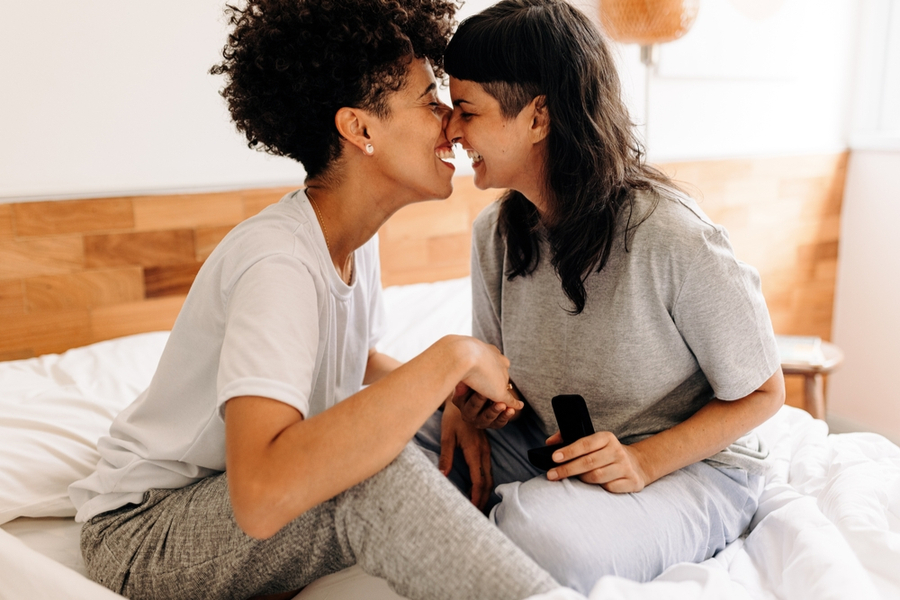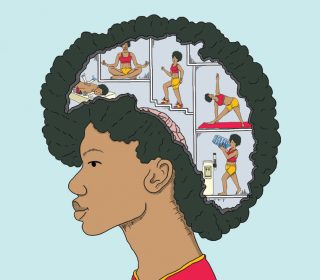What straight people can learn about sex – from LGBTQ people

Thankfully, old-fashioned, derogatory euphemisms for people attracted to the same gender – such as ‘batting for the other team’ – are falling out of favour these days. Society is waking up to the fact that sexuality shouldn’t be discussed in divisive ‘us and them’ terms. Straight people and Lesbian, Gay, Bisexual, Trans and Queer (LGBTQ) people aren’t batting against each other on different sides. We’re all on the same squad: Team Human.
But that’s not to say all sexualities and sexual cultures are homogenous – and there’s a lot of positive things we can learn from one another, about everything from new ways to savour sensual pleasure, to fresh approaches to communication that can benefit all types of partnerships. After all, love is love, and the more we all talk about it openly and share our experiences, the more lovely life can be for everybody.
RESTRICTIVE IDEAS
Traditional gender roles can be seriously limiting – no matter how you define your sexuality. Relationship mentor Vena Ramphal, star of the erotic education TV show Sex Pod, says: “I find many straight people feel tied to restrictive ideas of masculinity and femininity and get hung up on how they’re supposed to act as a ‘real man’ or a ‘good woman’; in contrast, gay culture is better at encouraging people to choose how they express their gender in a way that feels authentic and freeing to them, rather than following a rigid script. Letting go of the pressure to perform in a certain way that’s apparently dictated by what genitals you have can not only lead to more fulfilling, playful sex, but also a wider feeling of self-liberation that spills over into your social and professional life. LGBTQ communities teach that gender is a verb, not a noun: it’s something you do, not what you are.”
Cindy identifies herself as sexually fluid – she fancies both men and women, and her tastes tend to change over time. She agrees with Vena. “I think it’s important for everyone to recognise and challenge gender roles in their relationships, and consciously find ways to live that work for you as a couple or family, rather than blindly doing what mainstream culture expects of you,’ she says. ‘This involves examining yourself and what you really want, communicating that effectively and listening to your lover when they do the same. That way, you can avoid years of potential resentment about being “expected” to be dominant in bed.”
SENSUOUS JOY
Putting the ‘P in the V’ isn’t the only way to have sex – and penetration doesn’t always have to be the ultimate aim.
As lesbian Abebi puts it: “I hate the term ‘foreplay’ – it suggests that any form of sexual touch that doesn’t involve putting a wiener in a vag-eena is just second-rate build-up to the main event of penetration. My experiences as a girl who likes girls suggest you don’t need a penis to have a great time and I wonder whether some straight couples could discover a whole new world of sensuous joy if they stopped seeing penetrative sex as the be all and end all. I suspect some men would welcome a break from them pumping away being viewed as such a big deal, too – it must be stressful to feel like the “success” of a sexual encounter rests entirely upon your erection.”
Dr Meg-John Barker tutors sex, gender and relationships via the Open University, and is co-author of Enjoy Sex (How, When And If You Want To) with sex educator Justin Hancock. Dr Barker says: “Because intimate interactions between queer people often involve bodies that can’t conform to the standard ‘penis in vagina’ model of intercourse, their definition of what “sex” is becomes more flexible – and it can be more luscious, too. Some queer couples take turns to focus on one person’s pleasure each time they play, rather than always seeking to please them both at once, and many experiment with stimulating other parts of the brain and body apart from the genitalia, too.”
A DEEPER LEVEL
Knowing yourself – and accepting yourself – provides a solid foundation for interacting with others.
Juliette Prais, CEO of queer dating and matchmaking company Pink Lobster, says: “Queer people have often faced challenging times while growing up and figuring out their identities, which sometimes force them to examine themselves on a deeper level than some straight individuals. I’d encourage heterosexual folks to develop their self-awareness in whatever ways they find helpful (self-help books, open-minded conversations with friends and so on), because truly knowing yourself helps prevent you entering into a relationship where you’re unwittingly moulded to another person’s desires.”
GET PHYSICAL
Jess Wilde from online erotic retailer Lovehoney muses, “If you’re part of a [cis] same-sex pair, you may well have a better understanding of how things feel in bed for your lover, because you have similar bodies, and can experience the same sorts of touch.” Straight couples can improve their lovemaking by educating themselves as much as possible about the anatomy and physical workings of the opposite sex – from periods and G-spots to prostates and scrotums. So, do your homework, ask questions to expand your knowledge and enjoy exploring the whole of each other.
Read more: Sex quiz — how satisfied are you with your sex life?









